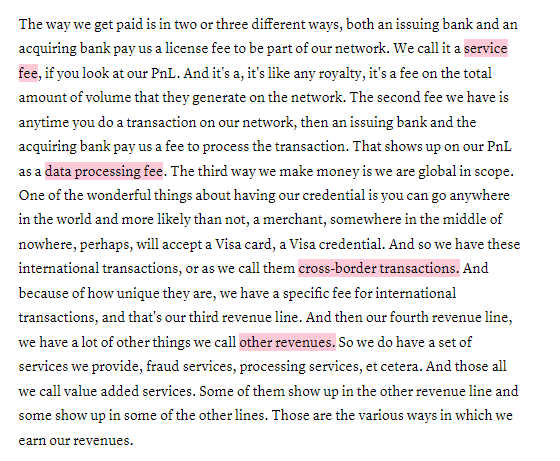Welcome to Chit Chat Money’s Sunday Finds + 3 Thoughts From Last Week. In this newsletter you will find three topics I thought about last week, links to shows we’ve recently released, and links to some interesting articles, podcasts, and tweets. Check out the archive here.
1. What is a stock you can own for 75 years?
On this week’s Power Hour a listener asked us to come up with stocks that we could own until we died. Thinking optimistically, we figured having a 75-year time horizon was the right frame of reference given that we are in our 20s. Although a 50-year vs. 75-year time horizon isn’t that different given how unpredictable the world is looking out 10 years or more.
Without having any preparation, here are the three stocks I came up with: Hershey, Pepsico, and Costco.
The Hershey and Pepsi bets are quite similar. Both companies own a variety of salty, sugary, and savory food/drink brands that have been generally well-loved by consumers for decades. I don’t think it is much of a stretch people will still drink Pepsi and eat Hershey bars a few decades from now.
Plus, if there is any worry about terminal value in a much healthier world 75 years from now (no idea the likelihood of that) I think I would recoup much more than my cost basis in dividends by then.
The Costco idea comes from the almost impenetrable moat with the core “family with kids” target market. While an expensive stock today and a retail model that has not been around for 75 years, I have a hard time thinking Costco won’t be a part of North American society a few decades from now.
While I still like those ideas, I came up with some others I think are better for a 75-year time horizon that have less terminal value risk. First, I would look at stock exchange companies like Intercontinental Exchange. These businesses have phenomenal moats and should do fine as long as stocks are publicly traded, which I bet they will be 75 years from now.
Second, I would look at railroads like the Union Pacific. I haven’t studied them closely, but they also feel like permanent parts of our society that will be extremely hard to disrupt due to the energy efficiency (or lack thereof) in other modes of transportation.
2. Chipmakers and China Risk
Another domino has fallen in the growing dispute between the United States and China:
U.S. chip stocks tumbled on Thursday, with the main semiconductor index down more than 3% after Nvidia (NVDA.O) and Advanced Micro Devices (AMD.O) said U.S. officials told them to stop exporting cutting-edge processors for artificial intelligence to China.
I’m not going to pretend I know the long-term implications for these companies or what will happen next, but I do know it adds a lot of uncertainty for investors.
It also has me thinking about China risk in general. For American companies, I think you can group them into three buckets:
Zero or inconsequential direct exposure to China. This is someone like Alphabet/Google. A harder Cold War against China might have knock-on effects on Alphabet’s bottom line, but it would not directly hurt its business.
Major exposure to China, but in a low-tech industry. Three companies that come to mind are Nike, Disney, and Apple (Apple has TSMC exposure, but people don’t buy their phones because of technological prowess). These companies will obviously get hurt if China and the United States escalate their dispute, which adds real risk to any investment thesis. But I think it is less likely these assets become the center of anything like the chipmakers are right now.
Major exposure to China in a high-tech industry. This could include industries like aerospace/space exploration, pharmaceuticals/biotechnology, and semiconductors. Given the strategic priorities these industries have for both nations, the risk of getting banned is much higher than for other companies. If you are investing in these companies, I think the rational thing to do is to expect all revenue from China to eventually go away. And if it doesn’t, well, that is just some extra upside you get as a shareholder. Why take this risk when the writing is on the wall?
3. Accuracy, Precision, and Too Many Numbers
I graduated with an engineering degree. One of the core things we learned across our studies was how to calculate accuracy, precision, and uncertainty when doing engineering work. It can help someone understand what they know they don’t know and how conservative they need to be in their designs, among other things.
Here is the definition of both accuracy and precision, since it can get a little confusing:
Precision and accuracy are two ways that scientists think about error. Accuracy refers to how close a measurement is to the true or accepted value. Precision refers to how close measurements of the same item are to each other. Precision is independent of accuracy. That means it is possible to be very precise but not very accurate, and it is also possible to be accurate without being precise. The best quality scientific observations are both accurate and precise.
Quality engineering work is both accurate and precise. The same might be said within the investing world when writing up a stock. However, I’m coming around to the idea that investors greatly overrate how accurate they can be when analyzing company financials and making projections.
Almost all the inputs to an investing model are estimates. Hell, even a lot of the numbers you take from SEC filings are just guesses from internal accounting teams. What this means is that if you use a ton of these figures to crunch numbers and project into the future, the likelihood that you are going to be wildly off is higher than you think. You can be as precise as you want, but there is a good chance everything you do is wildly inaccurate.
Knowing this, minimizing the number of calculations you make before investing in a company makes a ton of sense to me. Don’t assume you can analyze a business with the same amount of accuracy as someone analyzing the efficiency of a heat exchanger.
See you next week,
Brett
***Our fund, Arch Capital, may own securities discussed in this newsletter. Check our holdings page and read our full disclosure to learn more.***
***Want our free weekly wrap-up delivered to your inbox each week? Subscribe here***
Catch up on Our Shows From Last Week
QuantumScape: A Zero or the Next Tech Giant? With Simon Erickson
Investing Power Hour #22: Bear Market Is Back, Companies You Could Buy and Hold for 75 Years
Sunday Finds is brought to you by CCM+, our subscription podcast/research feed. For $5 a month, subscribers get:
A weekly Not So Deep Dive episode covering the basics of an individual stock.
A newsletter with research notes, charts, and valuation work for that week’s premium podcast episode.
Access to our historical research folder for all of our CCM+ episodes.
A monthly Arch Capital investment fund episode covering a stock we own in our limited partnership.
Sign-up directly through Spotify or Apple Podcasts. On other podcast players, you can build a private RSS feed through this link: https://anchor.fm/chitchatmoney/subscribe
3 Good Reads
Envy is The Cancer of the Soul - More to That
This is because a shared history implies some form of equality, a starting point where both of you had a blank slate. In John’s case, it could his high school friend, his old college roommate, or his co-founder of the failed company they started. If any of these people then went on to reach the level of success that John now desires, then John will feel that he missed out on something that the other person clearly took advantage of.
Since fully acquiring Reynolds American, British American Tobacco has steadily deleveraged while paying an increasing dividend while also engaging in significant R&D and M&A, and now, the company’s transformation is reaching a powerful inflection point.
Cloudflare: Cloudy With a Chane of Hypergrowth - MT Capital Newsletter
As Cloudflare likes to point out, the internet in its earliest form was not built for what it has become today. Starting out as a medium for a few scientists to transfer files between their university computers, a feat that required a design of extraordinary complexity at the time, the internet now exists as a medium that billions of people interact with, powering the inner mechanisms of almost every business and economy known to man.
1 Good Listen
Zuckerberg’s Biggest Bet - The Land of the Giants
Mark Zuckerberg has a vision for the future -- that in a few years, we’ll be living our digital lives in a blend of augmented and virtual reality. The metaverse. To pursue that vision, Zuckerberg’s renamed his entire company and invested billions of dollars in a bid to make Meta the leader of the next tech platform. In our season finale: what are the chances his bet pays off, and why it would give Meta more power than ever.
Smart and Funny Tweets:




















